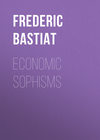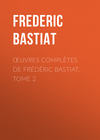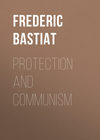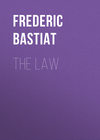Читать книгу: «Economic Sophisms», страница 16
"This brings me to examine the leading idea of the commission, which is, on the other hand, that the rate of postage should be a source of revenue to government.
"This idea runs through your entire report, and I allow that, under the influence of this prejudice, you could arrive at nothing great or comprehensive, and you are fortunate if, in trying to reconcile the two systems, you have not fallen into the errors and drawbacks of both.
"The first question we have to consider is this: Is the correspondence which passes between individual citizens a proper subject of taxation?
"I shall not fall back on abstract principles, or remind you that the very essence of society being the communication of ideas, the object of every government, should be to facilitate and not impede this communication.
"Let us look to actual facts.
"The total length of our highways and departmental and country roads extends to a million of kilomètres (625,000 miles). Supposing that each has cost 100,000 francs (£4000), this makes a capital of 100 milliards (£4,000,000,000) expended by the State to facilitate the transport of passengers and goods.
"Now, put the question, if one of your honourable colleagues asked leave of the Chamber to bring in a bill thus conceived:
"'From and after 1st January next, the Government will levy upon all travellers a tax sufficient not only to cover the expense of maintaining the highways, but to bring back to the Exchequer four or five times the amount of that expense…
"Would you not feel such a proposal to be anti-social and monstrous?
"How is it that this consideration of profits, nay, of simple remuneration, never presents itself to our minds when the question regards the circulation of commodities, and yet appears so natural when the question regards the circulation of ideas?
"Perhaps it is the result of habit. If we had a postal system to create, it would most assuredly appear monstrous to establish it on a principle of revenue.
"And yet remark that oppression is more glaring in this case than in the other.
"When Government has opened a new road it forces no one to make use of it (It would do so undoubtedly if the use of the road were taxed.) But while the Post-office regulations continue to be enforced, no one can send a letter through any other channel, were it to his own mother.
"The rate of postage, then, in principle, ought to be remunerative, and, for the same reason, uniform.
"If we set out with this idea, what marvellous beauty, facility, and simplicity does not the reform I am advocating present!
"Here is the whole thing nearly put into the form of a law.
"'Article 1. From and after 1st January next there will be exposed to sale, in every place where the Government judges it expedient, stamped envelopes and covers, at the price of a halfpenny or a penny.
"'2. Every letter put into one of these envelopes, and not exceeding the weight of half an ounce, every newspaper or print put into one of these covers, and not exceeding the weight of… will be transmitted, and delivered without cost at its address.
"'3. All Post-office accounting is entirely suppressed.
"'4. All pains and penalties with reference to the conveyance of letters are abolished.'
"That is very simple, I admit – much too simple; and I anticipate a host of objections.
"That the system I propose may be attended with drawbacks is not the question; but whether yours is not attended with more.
"In sober earnest, can the two (except as regards revenue) be put in comparison for a moment?
"Examine both. Compare them as regards facility, convenience, despatch, simplicity, order, economy, justice, equality, multiplication of transactions, public satisfaction, moral and intellectual development, civilizing tendency; and tell me honestly if it is possible to hesitate a moment.
"I shall not stop to enlarge on each of these considerations – I give you the headings of twelve chapters, which I leave blank, persuaded that no one can fill them up better than yourself.
"But since there is one objection – namely, revenue – I must say a word on that head.
"You have constructed a table in order to show that even at twopence the revenue would suffer a loss of £880,000.
"At a penny, the loss Would be £1,120,000, and at a halfpenny, of £1,320,000; hypotheses so frightful that you do not even formulate them in detail.
"But allow me to say that the figures in your report dance about with a little too much freedom. In all your tables, in all your calculations, you have the tacit reservation of coteris paribus. You assume that the cost will be the same under a simple as under a complicated system of administration – the same number of letters with the present average postage of 4 1/2d. as with the uniform rate of twopence. You confine yourself to this rule of three: if 87 millions of letters at 4d. yield so much, then at 2d. the same number will yield so much; admitting, nevertheless, certain distinctions when they militate against our proposed reform.
"In order to estimate the real sacrifice of revenue, we must, first of all, calculate the economy in the service which will be effected; then in what proportion the amount of correspondence will be augmented. We take this last datum solely into account, because we cannot suppose that the saving of cost which will be realized will not be met by an increased personnel rendered necessary by a more extended service.
"Undoubtedly, it is impossible to fix the exact amount of increase in the circulation of letters which the reduction of postage would cause, but in such matters a reasonable analogy has always been admitted.
"You yourself admit that in England a reduction of seven-eighths in the rate has caused an increase of correspondence to the extent of 360 per cent.
"Here, the lowering to 5 centimes (a halfpenny) of the rate which is at present at an average of something less than 4 1/2d., would constitute likewise a reduction of seven-eighths. We may therefore be allowed to expect the same result – that is to say, 417 millions of letters, in place of 116 millions.
"But let us count on 300 millions.
"Is there any exaggeration in assuming that with a rate of postage one half less, we shall reach an average of 8 letters to each inhabitant when in England they have reached 13.
Now 300 millions of letters, at 5 centimes, give, 15
100 millions of journals and prints, at 5 centimes, give 5
The present expense (which may diminish) is.
31 Deducting for mail steamers…5
There remains for despatches, travellers, and money parcels…26
Net product…2
At present the net product is…19
"Now I ask whether the Government, which makes a positive sacrifice of 800 millions (£32,000,000) per annum in order to facilitate the gratuitous transport of passengers, should not make a negative sacrifice of 17 millions, in order not to make a gain upon the transmission and circulation of ideas?
"But the Treasury, I am aware, has its own habits, and with whatever complacence it sees its receipts increase, it feels proportional disappointment in seeing them diminished by a single farthing. It seems to be provided with those admirable valves which in the human frame allow the blood to flow in one direction, but prevent its return. Be it so. The Treasury is perhaps a little too old for us to quicken its pace. We have no hope, therefore, that it will give in to us. But what will be said if I, Jacques Bonhomme, show it a way which is simple, easy, convenient, and essentially practical, of doing a great service to the country without its costing a single farthing?
"The Post-office yields a gross return to the Treasury of…50 millions
Total yield of these three services, 280 millions.
"Now, bring down postages to the uniform rate of 5 centimes (a halfpenny).
"Lower the salt-tax to 10 francs (8s.) the hundredweight, as the Chamber has already voted.
"Give me power to modify the customs tariff in such a way that I shall be peremptorily prohibited from increasing any duty, but that I may lower duties at pleasure.
"And I, Jacques Bonhomme, guarantee you a revenue, not of 280 millions, but of 300 millions. Two hundred French bankers will be my sureties, and all I ask for my reward is as much as these three taxes will produce over and above 300 millions.
"Is it necessary for me to enumerate the advantages of my proposal?
"1. The people will receive all the advantage resulting from cheapness in the price of an article of the first necessity – salt.
"2. Fathers will be able to write to their sons, and mothers to their daughters. Nor will men's affections and sentiments, and the endearments of love and friendship, be stemmed and driven back into their hearts, as at present, by the hand of the tax-gatherer.
"3. To carry a letter from one friend to another will no longer be inscribed in our code as a crime.
"4. Trade will revive with liberty, and our merchant shipping will recover from its humiliation.
"5. The Treasury will gain at first twenty millions, afterwards it will gain all that shall accrue to the revenue from other sources through the saving realized by each citizen on salt, postages, and other things, the duties on which have been lowered.
"If my proposal is rejected, what am I to conclude? Provided the bankers I represent offer sufficient security, under what pretext can my proposal be refused acceptance? It is impossible to invoke the equilibrium of budgets. It would indeed be upset, but upset in such a way that the receipts should exceed the expenses. This is no affair of theory, of system, of statistics, of probability, of conjecture; it is an offer, an offer like that of a company which solicits the concession of a line of railway. The Treasury tells me what it derives from postages, salt-tax, and customs. I offer to give it more. The objection, then, cannot come from the Treasury. I offer to reduce the tariff of salt, postages, and customs; I engage not to raise it; the objection, then, cannot come from the taxpayers. From whom does it come, then? From monopolists? It remains to be seen whether their voice shall be permitted in France to drown the voice of the Government and the people. To assure us of this, I beg you to transmit my proposal to the Council of Ministers. Jacques Bonhomme.
"P.S. – Here is the text of my offer: —
"I, Jacques Bonhomme, representing a company of bankers and capitalists, ready to give all guarantees and deposit whatever security may be necessary.
"Having learnt that the Government derives only 280 millions of francs from customs duties, postages, and salt-tax, by means of the duties at present fixed;
"I offer to give the Government 300 millions from the gross produce of these three sources of revenue;
"And this while reducing the salt-tax from 30fr. to l0fr.;
"Reducing the rate of postage from 42 1/2 centimes, at an average, to a uniform rate of from 5 to 10 centimes,
"On the single condition that I am permitted not to raise (which will be formally prohibited), but to lower as much as I please the duties of customs. Jacques Bonhomme."
"You are a fool," said I to Jacques Bonhomme, when he read me his letter. "You can do nothing with moderation. The other day you cried out against the hurricane of reforms, and here I find you demanding three, making one of them the condition of the other two. You will ruin yourself."
"Be quiet," said he, "I have made all my calculations; I only wish they may be accepted. But they will not be accepted." Upon this we parted, our heads full, his of figures, mine of reflections which I forbear to inflict upon the reader.
XIII. PROTECTION; OR, THE THREE CITY MAGISTRATES. Demonstration in Four
Tableaux.
Scene I. – House of Master Peter. – Window looking out on a fine park. – Three gentlemen seated near a good fire.
Peter: Bravo! Nothing like a good fire after a good dinner. It does feel so comfortable. But, alas! how many honest folks, like the Boi d'Yvetot,
"Soufflent, faute de bois,
Dans leurs doigts."
Miserable creatures! A charitable thought has just come into my head. You see these fine trees; I am about to fell them, and distribute the timber among the poor.
Paul and John: What! gratis?
Peter: Not exactly. My good works would soon have an end were I to dissipate my fortune. I estimate my park as worth £1000. By cutting down the trees I shall pocket a good sum.
Paul: Wrong. Your wood as it stands is worth more than that of the neighbouring forests, for it renders you services which they cannot render. When cut down it will be only good for firewood, like any other, and will not bring a penny more the load.
Peter: Oh! oh! Mr Theorist, you forget that I am a practical man. My reputation as a speculator is sufficiently well established, I believe, to prevent me from being taken for a noodle. Do you imagine I am going to amuse myself by selling my timber at the price of float-wood?
Paul: It would seem so.
Peter: Simpleton! And what if I can hinder float-wood from being brought into Paris?
Paul: That alters the case. But how can you manage it?
Peter: Here is the whole secret. You know that float-wood, on entering the city, pays 5d. the load. To-morrow, I induce the commune to raise the duty to £4, £8, £12, – in short, sufficiently high to prevent the entry of a single log. Now, do you follow me? If the good people are not to die of cold, they have no alternative but to come to my woodyard. They will bid against each other for my wood, and I will sell it for a high price; and this act of charity, successfully carried out, will put me in a situation to do other acts of charity.
Paul: A fine invention, truly! It suggests to me another of the same kind.
John: And what is that? Is philanthropy to be again brought into play?
Paul: How do you like this Normandy butter?
John: Excellent.
Paul: Hitherto I have thought it passable. But do you not find that it takes you by the throat? I could make better butter in Paris. I shall have four or five hundred cows, and distribute milk, butter, and cheese among the poor.
Peter and John: What! in charity?
Paul: Bah! let us put charity always in the foreground. It is so fine a figure that its very mask is a good passport. I shall give my butter to the people, and they will give me their money. Is that what is called selling?
John: No; not according to the Bourgeois Gentilhomme. But, call it what you please, you will ruin yourself. How can Paris ever compete with Normandy in dairy produce?
Paul: I shall be able to save the cost of carriage.
John: Be it so. Still, while paying that cost, the Normans can beat the Parisians.
Paul: To give a man something at a lower price – is that what you call beating him?
John: It is the usual phrase; and you will always find yourself beaten.
Paul: Yes; as Don Quixote was beaten. The blows will fall upon Sancho. John, my friend, you forget the octroi.
John: The octroi! What has that to do with your butter?
Paul: To-morrow, I shall demand protection, and induce the commune to prohibit butter being brought into Paris from Normandy and Brittany. The people must then either dispense with it, or purchase mine, and at my own price, too.
John: Upon my honour, gentlemen, your philanthropy has quite made a convert of me.
"On apprend à hurler, dit l'autre, avec les loups."
My mind is made up. I shall not be thought unworthy of my colleagues. Peter, this sparkling fire has inflamed your soul. Paul, this butter has lubricated the springs of your intelligence. I, too, feel stimulated by this piece of powdered pork; and tomorrow I shall vote, and cause to be voted, the exclusion of swine, dead and alive. That done, I shall construct superb sheds in the heart of Paris,
"Pour l'animal immonde aux Hebreux defendu."
I shall become a pig-driver and pork-butcher. Let us see how the good people of Paris can avoid coming to provide themselves at my shop.
Peter: Softly, my good friends; if you enhance the price of butter and salt meat to such an extent, you cut down beforehand the profit I expect from my wood.
Paul: And my speculation will be no longer so wondrously profitable, if I am overcharged for my firewood and bacon.
John: And I, what shall I gain by overcharging you for my sausages, if you overcharge me for my faggots and bread and butter?
Peter: Very well, don't let us quarrel Let us rather put our heads together and make reciprocal concessions. Moreover, it is not good to consult one's self-interest exclusively – we must exercise humanity, and see that the people do not want fuel.
Paul: Very right; and it is proper that the people should have butter to their bread.
John: Undoubtedly; and a bit of bacon for the pot.
All: Three cheers for charity; three cheers for philanthropy; and to-morrow we take the octroi by assault.
Peter: Ah! I forgot. One word more; it is essential. My good friends, in this age of egotism the world is distrustful, and the purest intentions are often misunderstood. Paul, you take the part of pleading for the wood; John will do the same for the butter; and I shall devote myself to the home-bred pig. It is necessary to prevent malignant suspicions.
Paul and John (leaving): Upon my word, that is a clever fellow.
Scene II. – Council Chamber.
Paul: Mes chers collègues, Every day there are brought to Paris great masses of firewood, which drain away large sums of money. At this rate, we shall all be ruined in three years, and what will become of the poorer classes? (Cheers) We must prohibit foreign timber. I don't speak for myself, for all the wood I possess would not make a tooth-pick. In what I mean to say, then, I am entirely free from any personal interest or bias. (Hear, hear) But here is my friend Peter, who possesses a park, and he will guarantee an adequate supply of fuel to our fellow-citizens, who will no longer be dependent on the charcoal-burners of the Yonne. Have you ever turned your attention to the risk which we run of dying of cold, if the proprietors of forests abroad should take it into their heads to send no more firewood to Paris? Let us put a prohibition, then, on bringing in wood. By this means we shall put a stop to the draining away of our money, create an independent interest charged with supplying the city with firewood, and open up to workmen a new source of employment and remuneration. (Cheers)
John: I support the proposal of my honourable friend, the preceding speaker, which is at once so philanthropic, and, as he himself has explained, so entirely disinterested. It is indeed high time that we should put an end to this insolent laissez passer, which has brought immoderate competition into our markets, and to such an extent that there is no province which possesses any special facility for providing us with a product, be it what it may, which does not immediately inundate us, undersell us, and bring ruin on the Parisian workman. It is the duty of Government to equalize the conditions of production by duties wisely adapted to each case, so as not to allow to enter from without anything which is not dearer than in Paris, and so relieve us from an unequal struggle. How, for example, can we possibly produce milk and butter in Paris, with Brittany and Normandy at our door? Remember, gentlemen, that the agriculturists of Brittany have cheaper land, a more abundant supply of hay, and manual labour on more advantageous terms.
Does not common sense tell us that we must equalize the conditions by a protective octroi tariff? I demand that the duty on milk and butter should be raised by 1000 per cent., and still higher if necessary. The workman's breakfast will cost a little more, but see to what extent his wages will be raised! We shall see rising around us cow-houses, dairies, and barrel chums, and the foundations laid of new sources of industry. Not that I have any interest in this proposition. I am not a cowfeeder, nor have I any wish to be so. The sole motive which actuates me is a wish to be useful to the working classes. (Applause.)
Peter: I am delighted to see in this assembly statesmen so pure, so enlightened, and so devoted to the best interests of the people. (Cheers) I admire their disinterestedness, and I cannot do better than imitate the noble example which has been set me. I give their motions my support, and I shall only add another, for prohibiting the entry into Paris of the pigs of Poitou. I have no desire, I assure you, to become a pig-driver or a pork-butcher. In that case I should have made it a matter of conscience to be silent. But is it not shameful, gentlemen, that we should be the tributaries of the peasants of Poitou, who have the audacity to come into our own market and take possession of a branch of industry which we ourselves have no means of carrying on? and who, after having inundated us with their hams and sausages, take perhaps nothing from us in return? At all events, who will tell us that the balance of trade is not in their favour, and that we are not obliged to pay them a tribute in hard cash? Is it not evident that if the industry of Poitou were transplanted to Paris, it would open up a steady demand for Parisian labour? And then, gentlemen, is it not very possible, as M. Lestiboudois has so well remarked, that we may be buying the salt pork of Poitou, not with our incomes, but with our capital? Where will that land us? Let us not suffer, then, that rivals who are at once avaricious, greedy, and perfidious, should come here to undersell us, and put it out of our power to provide ourselves with the same commodities. Gentlemen, Paris has reposed in you her confidence; it is for you to justify that confidence. The people are without employment; it is for you to create employment for them; and if salt pork shall cost them a somewhat higher price, we have, at least, the consciousness of having sacrificed our own interests to those of the masses, as every good magistrate ought to do. (Loud and long-continued cheers.)
A Voice: I have heard much talk of the poor; but under pretext of affording them employment, you begin by depriving them of what is more valuable than employment itself, namely, butter, firewood, and meat.
Peter, Paul, and John: Vote, vote! Down with Utopian dreamers, theorists, generalizers! Vote, vote! (The three motions are carried.)
Scene III. – Twenty years afterwards.
Son: Father, make up your mind; we must leave Paris. Nobody can any longer live there – no work, and everything dear.
Father: You don't know, my son, how much it costs one to leave the place where he was born.
Son: The worst thing of all is to perish from want.
Father: Go you, then, and search for a more hospitable country. For myself, I will not leave the place where are the graves of your mother, and of your brothers and sisters. I long to obtain with them that repose which has been denied me in this city of desolation.
Son: Courage, father; we shall find employment somewhere else – in Poitou, or Normandy, or Brittany. It is said that all the manufactures of Paris are being removed by degrees to these distant provinces.
Father: And naturally so. Not being able to sell firewood and provisions, the people of these provinces have ceased to produce them beyond what their own wants call for. The time and capital at their disposal are devoted to making for themselves those articles with which we were in use to furnish them.
Son: Just as at Paris they have given up the manufacture of elegant dress and furniture, and betaken themselves to the planting of trees, and the rearing of pigs and cows. Although still young, I have lived to see vast warehouses, sumptuous quarters of the city, and quays once teeming with life and animation on the banks of the Seine, turned into meadows and copses.
Father: While towns are spread over the provinces, Paris is turned into green fields. What a deplorable revolution! And this terrible calamity has been brought upon us by three magistrates, backed by public ignorance.
Son: Pray relate to me the history of this change.
Father: It is short and simple. Under pretext of planting in Paris three new branches of industry, and by this means giving employment to the working classes, these men got the commune to prohibit the entry into Paris of firewood, butter, and meat. They claimed for themselves the right of providing for their fellow-citizens. These commodities rose at first to exorbitant prices. No one earned enough to procure them, and the limited number of those who could procure them spent all their income on them, and had no longer the means of buying anything else. A check was thus given to all other branches of industry and production, and all the more quickly that the provinces no longer afforded a market. Poverty, death, and emigration then began to depopulate Paris.
Son: And when is this to stop?
Father: When Paris has become a forest and a prairie.
Son: The three magistrates must have made a large fortune?
Father: At first they realized enormous profits, but at length they fell into the common poverty.
Son: How did that happen?
Father: Look at that ruin. That was a magnificent man-sion-house surrounded with a beautiful park. If Paris had continued to progress, Master Peter would have realized more interest than his entire capital now amounts to.
Son: How can that be, seeing he has got rid of competition?
Father: Competition in selling has disappeared, but competition in buying has disappeared also, and will continue every day to disappear more and more until Paris becomes a bare field, and until the copses of Master Peter have no more value than the copses of an equal extent of land in the Forest of Bondy. It is thus that monopoly, like every other system of injustice, carries in itself its own punishment.
Son: That appears to me not very clear, but the decadence of Paris is an incontestable fact. Is there no means, then, of counteracting this singular measure that Peter and his colleagues got adopted twenty years ago?
Father: I am going to tell you a secret. I remain in Paris on purpose. I shall call in the people to my assistance. It rests with them to replace the octroi on its ancient basis, and get quit of that fatal principle which was engrafted on it, and which still vegetates there like a parasitical fungus.
Son: You must succeed in this at once.
Father: On the contrary, the work will be difficult and laborious. Peter, Paul, and John understand one another marvellously. They will do anything rather than allow firewood, butter, and butchers' meat to enter Paris. They have on their side the people, who see clearly the employment which these three protected branches of industry afford. They know well to what extent the cowfeeders and wood-merchants give employment to labour; but they have by no means the same exact idea of the labour which would be developed in the open air of liberty.
Son: If that is all, you will soon enlighten them.
Father: At your age, my son, no doubts arise. If I write, the people will not read; for, to support their miserable existence, they have not much time at their disposal. If I speak, the magistrates will shut my mouth. The people, therefore, will long remain under their fatal mistake. Political parties, whose hopes are founded on popular passions, will set themselves, not to dissipate their prejudices, but to make merchandise of them. I shall have to combat at one and the same time the great men of the day, the people, and their leaders. In truth, I see a frightful storm ready to burst over the head of the bold man who shall venture to protest against an iniquity so deeply rooted in this country.
Son: You will have truth and justice on your side.
Father: And they will have force and calumny on theirs. Were I but young again! but age and suffering have exhausted my strength.
Son: Very well, father; what strength remains to you, devote to the service of the country. Begin this work of enfranchisement, and leave to me the care of finishing it.
Scene IV. – The Agitation.
Jacques Bonhomme: Parisians, let us insist upon a reform of the octroi duties; let us demand that they be instantly brought down to the former rate. Let every citizen be free to buy his firewood, butter, and butchers' meat where he sees fit.
The People: Vive, vive la Liberte!
Peter: Parisians, don't allow yourselves to be seduced by that word, liberty. What good can result from liberty to purchase if you want the means – in other words, if you are out of employment? Can Paris produce firewood as cheaply as the Forest of Bondy? meat as cheaply as Poitou? butter as cheaply as Normandy? If you open your gates freely to these rival products, what will become of the cowfeeders, woodcutters, and pork-butchers? They cannot dispense with protection.
The People: Vive, vive la Protection!
Jacques Bonhomme: Protection! but who protects you workmen? Do you not compete with one another? Let the wood-merchants, then, be subject to competition in their turn. They ought not to have right by law to raise the price of firewood, unless the rate of wages is also raised by law. Are you no longer in love with equality?
The People: Vive, vive l'Egalite!
Peter: Don't listen to these agitators. We have, it is true, raised the price of firewood, butchers' meat, and butter; but we have done so for the express purpose of being enabled to give good wages to the workmen. We are actuated by motives of charity.
The People: Vive, vive la Charite!
Jacques Bonhomme. Cause the rate of wages to be raised by the octroi, if you can, or cease by the same means to raise the prices of commodities. We Parisians ask for no charity – we demand justice.
The People: Vive, vive la Justice!
Peter: It is precisely the high price of commodities which will lead, par ricochet, to a rise of wages.
The People: Vive, vive la Cherte!
Jacques Bonhomme: If butter is dear, it is not because you pay high wages to the workmen, it is not even because you make exorbitant profits; it is solely because Paris is ill-adapted for that branch of industry; it is because you wish to make in the town what should be made in the country, and in the country what should be made in the town. The people have not more employment – only they have employment of a different kind. They have no higher wages; while they can no longer buy commodities as cheaply as formerly.
Покупайте книги и получайте бонусы в Литрес, Читай-городе и Буквоеде.
Участвовать в бонусной программе



















